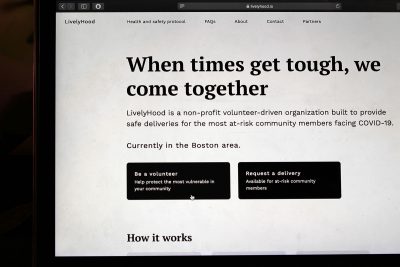As the pandemic continues to devastate the country, 1 million people, including one in five children, do not have access to healthy, affordable food in Massachusetts, according to a recent report from WBUR.

Even before the pandemic exacerbated the issue, food insecurity has loomed over the United States — an estimated 11.1 percent of American households were food insecure in 2018, according to the United States Department of Agriculture.
Now, entrepreneurs and student volunteers are finding creative ways to tackle the challenge of food scarcity.
Justin Crist Lee, a graduate student at Harvard Business School, co-founded “LivelyHood” — a website offering free delivery of essentials to vulnerable communities — with several other students in March at the start of the pandemic.
Lee was personally inspired to start the platform after a local food pantry where his mother volunteered closed because of the pandemic, leaving community members without the means to get those resources.
“She was worried about what they would be doing for the duration of the pandemic,” Lee said. “What we’ve seen is that there hasn’t really been a good solution or answer to that problem.”
The online platform aims to match Boston volunteers with local food delivery requests while also connecting with organizations that can supply those resources to volunteers and requesters.
To make these deliveries as contact-free as possible, Lee said communication is entirely conducted via phone calls so volunteers can choose to accept the requests and make deliveries safely.
“Efficiency and speed are one of the things we have really focused on,” Lee said, “and that’s part of the positive feedback we’ve gotten from partners as well.”
Lee said he hopes the platform makes an impact on food accessibility in particular, especially because social-distancing mandates and high COVID-19 transmission rates make leaving home a risk for many people.
“By allowing people to stay safely in the home, we’re allowing them to socially distance, just like everybody else,” Lee said. “Socially distancing shouldn’t be a privilege, it should be something everybody gets to do.”
Lee added this service is allowing people to redefine how social needs are met within the city.
“We are inspiring ourselves, as well as inspiring the people we work with, to think more creatively and innovatively about how to deliver basic social services within the city of Boston,” he said.
Battling food insecurity is also a mission at Boston University’s Community Service Center, which works with local community partners in the city. The CSC’s Student Food Rescue program allows students to combat hunger in Boston neighborhoods by picking up weekly groceries for community partners to distribute.
Saahil Adusumilli, a junior in the Sargent College of Health and Rehabilitation Sciences is a program manager for Student Food Rescue. He said the pandemic raised awareness about the program, which began in 1988.
“Due to COVID, a lot of people saw the importance of what we’re doing, because food insecurity as a whole had a spotlight this summer,” Adusumilli said. “People realized what food insecurity really is and how big of an issue it is in our country.”
The program also offered in-person volunteering options last semester, which Adusumilli said helped increase more student interest.
When it comes to potential improvement for the SFR program, Adusumilli said it would be helpful to have a more “streamlined” channel that connects food donors and recipients, such as an app. Adusumilli said a platform like LivelyHood is a great example of adding convenience and efficiency to the food rescue process.
“I think that would be a really easy way to match donors,” Adusumilli said. “and take away some of the burden that these organizations face when trying to match donors and recipients.”
Sargent senior Michael Gomez became a program manager because of his interest in minimizing food waste and insecurity.
Gomez said the program coordinates food donors with food recipients to ensure that community partners receive the food most needed. To Gomez’s surprise, a large number of local restaurants and grocery stores have been donating high-quality food to local communities.
“There are so many businesses all around Boston who have been so willing to help out and step up in these difficult times during COVID,” Gomez said, “Local businesses are very willing to help.”














































































































